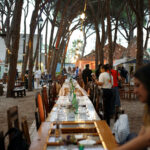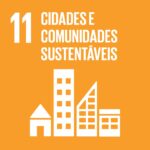
Chefs on Fire. In this festival, leftover food is transformed into energy
Here comes another edition of Chefs on Fire, one of the most important gastronomic festivals in the country. In addition to the sustainability actions that
We didn't find any happenings mapped to your criteria.
Try the traditional search to find articles not yet mapped with RUA.
We didn't find any happenings mapped to your criteria.
Try the traditional search to find articles not yet mapped with RUA.
We didn't find any happenings mapped to your criteria.
Try the traditional search to find articles not yet mapped with RUA.
We didn't find any happenings mapped to your criteria.
Try the traditional search to find articles not yet mapped with RUA.
One of the aims of the University of Coimbra’s project is to create a “Refuge House”, an infrastructure with a forest fire risk so low that people can take refuge inside with confidence in forest fire situations.
With climate change intensifying the frequency and intensity of wildfires, the Portuguese “Refuge House” project has emerged to promote new approaches in safety and construction to mitigate their impacts, combining science, technology and construction practices to protect lives and property in disaster situations.
Led by the Association for the Development of Industrial Aerodynamics (ADAI), from the University of Coimbra, this initiative brings together researchers, scientists and technicians who, after carrying out various studies, have concluded that “traditional houses, when well designed and maintained, can serve as safe places in the event of a fire, as long as they are surrounded by adequate fuel management areas”, reads a note from the University of Coimbra.
However, buildings in Portugal have shown vulnerabilities which, although they can be corrected, require planned interventions.
“Current legislation requires a safety strip of 50 to 100 meters around homes and settlements, respectively, but these distances are sometimes inadequate. The project proposes a more flexible and scientifically based approach, adapted to the topography and danger of the site. In areas such as hillsides, for example, an ellipse configuration can offer more effective protection than the circular format usually applied,” points out Miguel Almeida, the project’s principal investigator, quoted in the press release.
The ultimate aim of the project is to design a “Refuge House”, “an infrastructure with such a low risk of forest fire that it allows people to take refuge inside with confidence in a forest fire situation”, reads the project’s website.
Experts recognize that civil protection capabilities may be insufficient in extreme scenarios, especially due to the climate crisis, which highlights the need for the population to adopt effective self-protection measures.
“This project aims to create guidelines that help citizens turn their homes into safe havens, using passive techniques such as proper fuel management, good building practices and active techniques such as sprinkler systems” or more innovative systems such as fireproof screens, says the ADAI researcher.
To mitigate the risk of rural fire, the “House-Refuge” project aims to draw up guidelines for the construction of buildings combining the two components of the system: building and surrounding area.
“The surrounding area will be defined in such a way as to prevent the forest fire from reaching homes. These definitions include the design of fuel breaks and the construction of barriers to prevent the fire from spreading, among other solutions. In terms of the building itself, the best construction solutions will be studied to prevent the fire from igniting and developing once it reaches the building (e.g. materials used, architectural and civil engineering solutions, etc.),” the project explains on its website.
So far, the project has made significant progress, such as compiling national and international legislation on protecting buildings against rural fires and analyzing case studies, with the aim of informing and influencing future legal reforms and guiding better construction practices.
The main results include recommendations for legislation adapted to the Portuguese reality and the specificities of the urban-forest interface, the definition of best practices to mitigate risks in rural areas and an assessment of the insurance market in relation to fire risk coverage, highlighting the need for reforms in the sector.
“The Refuge House project is a decisive step forward in Portugal’s ability to deal with fires in the urban-forest interface, integrating components of civil protection, sustainability and technological innovation. With a multifaceted approach, the project promises to create more resilient communities that are prepared for the future,” concludes Miguel Almeida.


Here comes another edition of Chefs on Fire, one of the most important gastronomic festivals in the country. In addition to the sustainability actions that

From July 31st to August 4th there will be another edition of the Tradidanças festival, the one that gets everyone of all ages dancing for

Greenpeace opens office in Portugal and brings the icebreaker Artic Sunrise. The organization’s focus will be on fighting fires and protecting biodiversity, especially the oceans.

This article addresses an action that promotes change towards more inclusive, safe, resilient and sustainable cities and communities, helping toreduce the adverse environmental impact of cities.
 To discover businesses that are actively working to contribute to this Sustainable Development Goal, click here.
To discover businesses that are actively working to contribute to this Sustainable Development Goal, click here. To read news, interviews or tips related to this Goal, click here.
To read news, interviews or tips related to this Goal, click here.Esta publicação também está disponível em:
![]() Português (Portuguese (Portugal))
Português (Portuguese (Portugal))

